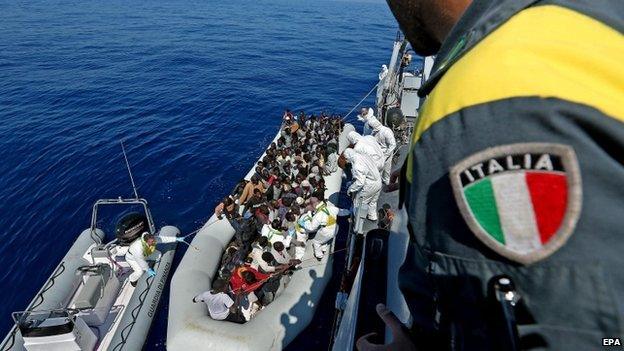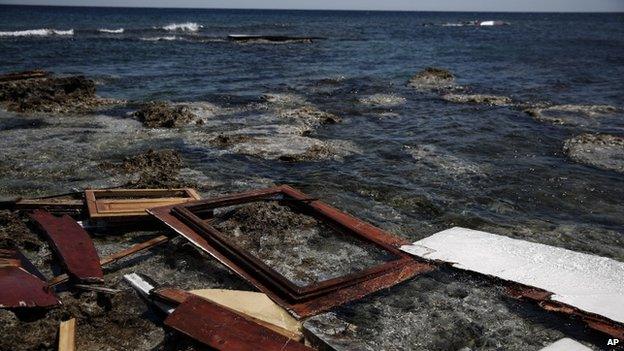EU faces decision time on migrants
- Published
Some of the Italian media have labelled the current crisis a "migrant invasion", as Katya Adler reports from Rome
"The most macabre travel agents in history" is how Italy's Interior Minister Angelino Alfano describes the people smugglers who charge migrants sums they can ill-afford to cross the Mediterranean in unsafe boats.
Italy hopes its EU partners will on Thursday support an initiative to get a military mandate to destroy traffickers' vessels before they use them. The exact details are still unclear but a mandate from the EU - possibly also the UN - would be needed.
A British government source told us that all options were on the table.
Other proposals to be debated also include significantly boosting the EU's maritime patrol to help rescue migrants.
Not quite on a par with Italy's former search and rescue programme but still a huge change.
Libya, too, will be high on the discussion agenda. Italy says 90% of the immigrants washing up on its shores come by boat from there.
It also worries about the organisation calling itself Islamic State, operating so close to Libya's maritime border. There are fears IS could pose a huge security risk for Europe. In the past, it has explicitly threatened Italy.

Italy wants more help from EU states to tackle the migrant issue
Add into the mix a German-backed plan to spread migrants out more equally amongst EU countries - an extremely divisive issue - and you can see that the emergency summit will be a challenging one for its participants.
But it's all or nothing according to Italian Prime Minister Matteo Renzi. He's demanding a fully comprehensive political - and financial - solution to the migrant crisis, rather than an emotional response by the EU and its member countries.
Italians want their government to put the rest of the EU under pressure. They feel that they are struggling to cope, between their country's steep economic downturn on the one hand and what their media have dubbed "a migrant invasion" on the other.
Anti-immigrant populist politicians here in Italy as elsewhere in Europe are gaining ground on the back of the debate.
That's why so many European governments have, until now, silently looked the other way when it comes to the perils of migrants at sea. They feared that tackling the issue could cost them domestically.
But Europe is now waking up to the realisation that this is a problem for the continent as a whole.

More than 1,700 people have died so far this year trying to cross the Mediterranean in unsafe boats
Most migrants arriving in Italy or Greece don't want to stay there, preferring to slip invisibly over national borders until they reach richer destinations like Germany, Sweden or the UK.
Germany had 200,000 asylum applications last year alone. In 2015 the numbers are expected to rise even further.
The face of Europe is changing. Too fast for some.
This is decision time but also a moment for soul searching.
Some kind of common document will certainly emerge at the end of today's summit. The real test will be to see if those plans are then implemented.
Europe made bold declarations on immigration just under two years ago, also following dreadful loss of life in the Mediterranean.
The plans, external were similar to a number of proposals now being discussed.
Yet here we are again.